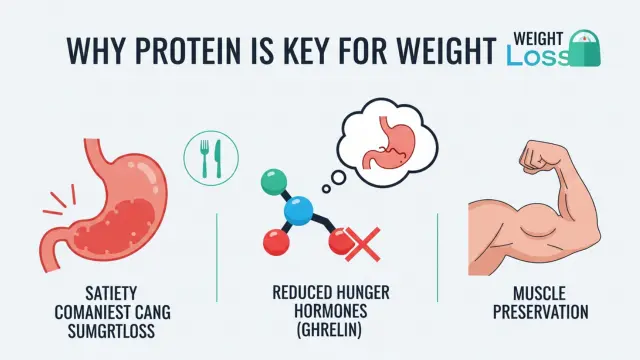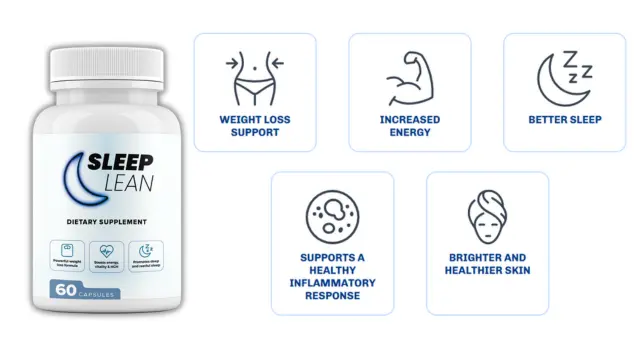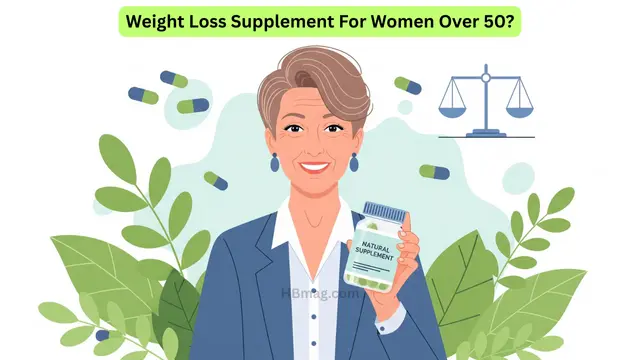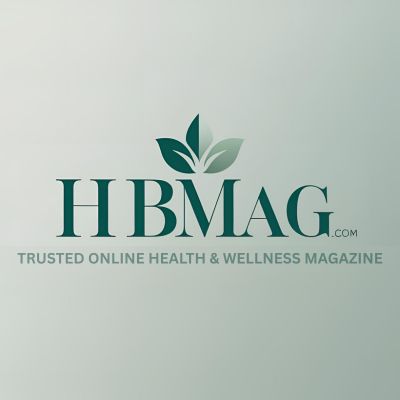For many women, reaching 50 brings new challenges in weight management. Hormonal shifts during perimenopause and menopause play a big role. Lower estrogen levels can change where fat is stored, often increasing belly fat. Research shows women in midlife gain 1.5 pounds a year, even if their habits stay the same, meaning no lifestyle or diet change, they still gain weight.
Metabolism slows down with age. After 50, muscle mass naturally declines, a condition called sarcopenia1Sarcopenia in older adults, National Library of Medicine. Since muscle burns more calories at rest than fat, losing muscle makes it harder to maintain a healthy weight. And many women become less active because of joint pain, caregiving stress, or work demands. This creates a “triple effect”: fewer calories burned, more fat stored, and higher hunger signals.
Why Is Weight Loss Harder After 50
There are mainly these culprits behind it becoming tough for you to lose weight in your 50s.
- Sleep problems: Hot flashes and stress can disrupt sleep, raise cortisol levels. High cortisol is linked to sugar and fat cravings.
- Medication use: Common meds for blood pressure, thyroid, or mood can cause weight gain as a side effect.
- Blood sugar changes: Insulin resistance rises with age, making it easier to store fat and harder to burn it.
This is why even healthy women feel stuck despite eating well and exercising. It’s not about willpower. It’s about biology.
What Will You Understand In The Next 10 Minutes?
This article will cut through the noise and focus on safe and effective options. Many articles list endless “fat burners” without addressing the unique needs of women over 50. Our goal at HB Mag is different: we look at what science supports, what real women report, and how supplements can fit into a full lifestyle plan.
Here’s what you can expect in the next sections:
- Clear explanations: How weight loss supplements work, from appetite control to metabolism support.
- Ingredient spotlight: Evidence-backed options like glucomannan, green tea extract, and probiotics for weight loss in older women.
- Safety checks: Risks, side effects, and what to avoid—especially stimulant-heavy products.
- Best picks for 2025: Which supplements stand out for women in their 40s and 50s?
- Practical guidance: How to use supplements alongside diet, strength training, and daily habits.
- HB Mag exclusive: We also focus on muscle preservation as the foundation of weight loss in midlife. Many guides ignore this. Supplements that protect lean mass—like protein powders or collagen—may be just as important as fat burners. They don’t just help with weight control; they help with bone health, mobility, and long-term independence.
By the end, you’ll know the role supplements can play, what to expect, and how to choose.
What Are Weight Loss Supplements?
Weight loss supplements are oral dietary aids. They may contain fiber, plant extracts, caffeine, or probiotics. Weight loss supplements are not meant to treat or cure medical conditions—they support other efforts like diet and activity.
For women over 50, supplements are not magic pills—but they can help in specific ways:
- Reduce appetite (fiber, glucomannan)
- Block fat or carb absorption (green coffee extract)
- Boost metabolism (green tea extract, caffeine)
- Support gut health (probiotics)
Types Of Common Weight Loss Supplements
| Supplement | What It Does | Notes |
|---|---|---|
| Glucomannan (fiber) | Fills your stomach to curb hunger | Evidence is mixed, and dosage matters |
| Green Tea Extract | Burns fat and boosts metabolism | Effects depend on activity; results vary |
| Garcinia Cambogia | May suppress appetite | Very weak evidence overall |
| Probiotics | Might support fat loss via gut health | Modest effects; depends on strain and dose |
Key Differences Between Supplements and Medicines
- Supplements don’t need FDA approval, unlike prescription drugs.
- They can’t make medical claims—they must say “support,” not “treat.”
But be careful: some supplements have caused harm. For instance, certain herbal products were found to contain sibutramine, a prescription drug that raises heart risk. Also, powerful herbs like bitter orange can mimic ephedra2Bitter Orange, NIH(GOV). They raise blood pressure and may cause serious heart issues.
Muscle Matters More Than Fat
Here’s a perspective you won’t see often: for women over 50, protecting muscle is often more important than just burning fat. Muscle helps maintain metabolism. Supplements like protein, collagen, or HMB (a form of leucine) can help prevent muscle loss and support weight efforts.
This cautious, balanced approach helps with appetite, strength, and long-term health, not just short-term weight shifts.
What This Means for You
Weight loss supplements are not cures. They are tools. Use them with care. Check for third-party testing, stick to research-backed ingredients, and always pair them with healthy eating, activity, and muscle-preserving habits.
Why Women Over 50 Need Special Support
After 50, your body changes in ways that make weight loss harder. Hormone shifts during perimenopause and menopause move fat to the belly. This increases health risks like insulin resistance and heart disease. Studies and major clinics note this pattern.
Muscle loss also speeds up with age. From about age 30, muscle mass declines each decade.3Preserve your muscle mass, Harvard Medical School. That loss gets faster after 50 for many women. Less muscle means a slower resting metabolism. That makes it harder to burn calories, even at rest. Clinical reviews call this sarcopenia and show it is common in midlife women.
Other factors add up:
- Less activity: Pain, busy schedules, and low energy cut movement.
- Sleep problems: Night sweats and poor sleep raise cortisol. That can boost appetite and belly fat.
- Medications: Some drugs for mood, blood pressure, or thyroid can cause weight gain.
- Aging insulin function: Insulin resistance tends to rise with age, which favors fat storage.
Because of these shifts, women over 50 often need different tools than younger people. That’s why we focus on targeted supports like metabolism boosters for women over 50 and options that help during menopause. But note: supplements are helpers, not cures.
Practical, evidence-based priorities for midlife weight care:
- Protect the muscle first. Strength training and adequate protein keep metabolism steady. Supplements like protein powders, collagen, or HMB can support this goal.
- Control appetite safely. Soluble fiber (for example, glucomannan) can help reduce hunger without stimulants.
- Support blood sugar and gut health. Ingredients like berberine and specific probiotics may help control glucose and metabolism.
- Avoid high-dose stimulants. Older hearts and blood pressure can react badly to strong stimulants in some “fat burners.”

Editorial insight: Most other guides chase fat-burning hype. For women 50+, the smart play is preservation first, burning second. Protecting lean mass and stabilizing blood sugar often gives a bigger, safer return than short-term stimulant-driven weight loss. This approach also supports bone health, mobility, and long-term independence—goals that matter far beyond the scale.
If you want a quick plan, try this:
| Step | What To Do | Why It Matters for Women 40+ |
|---|---|---|
| Assess | Check with your doctor about medications, thyroid function, and menopause-related symptoms. | Medical factors can slow metabolism or make weight harder to manage. Knowing your baseline helps create a safe plan. |
| Preserve | Add strength training 2–3 times per week and increase lean protein intake. | Muscle mass drops with age, lowering daily calorie burn. Strength training + protein preserves lean tissue and metabolism. |
| Support | Consider safe, research-backed supplements such as fiber, probiotics, or vitamin D. | These supplements support digestion, hormone balance, and overall health, making weight loss efforts more effective. |
How Weight Loss Supplements Work
Weight loss supplements support the body’s natural fat-burning and appetite-control systems. They don’t replace healthy habits, but they may make those habits more effective. For women over 50, this support can be especially important because metabolism, hormones, and muscle mass decline with age.
How Weight Loss Supplements Work
- Boost Metabolism
- Some supplements have green tea extract or caffeine that slightly increases calorie burning.
- A 2020 meta-analysis in Critical Reviews in Food Science and Nutrition found green tea catechins with caffeine can enhance fat oxidation and energy use.
- Control Appetite
- Fiber supplements (glucomannan or psyllium) swell in the stomach, making you feel full with fewer calories.
- Probiotics may also influence appetite hormones by improving gut health.
- Balance Hormones and Stress
- Ashwagandha and rhodiola may reduce stress-related eating by lowering cortisol levels.
- This is important for women after menopause, when hormonal changes can increase fat storage around the belly.
- Breakdown Fat
- CLA or L-carnitine helps the body use stored fat for energy.
- Research in Obesity Reviews found these may give modest but measurable results when combined with exercise.
Unique Insight: Mitochondria and Energy Efficiency
One area not often mentioned is the role of mitochondria. Mitochondria are the tiny energy factories inside cells. As we age, our efficiency also tends to slow down. It makes burning fat naturally harder for our bodies. Some modern supplements (astaxanthin, coenzyme Q10, or alpha-lipoic acid) support mitochondrial health. This could give older women an edge in maintaining their energy and using fat as a fuel source more effectively.
Simple Breakdown
| Mechanism | Example Ingredients | What It Helps With |
|---|---|---|
| Boost metabolism | Green tea, caffeine | Burn more calories |
| Control appetite | Fiber, probiotics | Reduce overeating |
| Balance hormones/stress | Ashwagandha, rhodiola | Prevent belly fat gain |
| Improve fat breakdown | CLA, L-carnitine | Use fat as energy |
| Support mitochondria | Astaxanthin, CoQ10, ALA | Better energy use |
Note: Supplements work best with a healthy diet, strength training, and sleep. For women over 50, they can help bridge the gaps caused by hormonal changes and slower metabolism, so healthy habits are easier to stick to.
Key Ingredients Backed by Research
Here are the ingredients that show the most consistent, practical evidence for women in midlife. I focus on what the science says and what matters for women over 40–50: appetite control, blood sugar, and — critically — muscle preservation.
Glucomannan (soluble fiber)
Glucomannan expands in the stomach and may reduce hunger. Trials give mixed results. Some meta-analyses show small benefits, others show no clear effect. If you try it, use the doses tested in trials (usually 2–4 g per day) and drink plenty of water.
Green tea extract (EGCG + caffeine)
Catechins in green tea can increase fat burning slightly, especially when combined with caffeine and activity. Meta-analyses show modest weight loss — often a pound or less — but the effect may matter when combined with diet and exercise. Habitual caffeine intake can change results.
Berberine
Berberine improves glucose control and may help with fat metabolism. Clinical reviews show benefits for blood sugar, cholesterol, and sometimes modest weight changes. Not a replacement for prescription GLP-1 drugs, but can help metabolic health when used safely and under medical advice. Watch for digestive side effects and drug interactions.
Probiotics (strain-specific)
Research shows certain strains (e.g., some Lactobacillus and Bifidobacterium blends) can help with body weight and waist size. Results vary by strain and dose. For older women, probiotics may also help gut health and insulin sensitivity — useful for midlife weight control. Pick products that list strains and doses.
Protein, Collagen, and HMB (muscle support)
Preserving lean mass is key after 50. Higher protein intake helps maintain muscle during weight loss. HMB (a leucine metabolite) shows promise for older adults to preserve strength and muscle when calories are reduced. Adding protein or HMB can protect metabolism while you lose fat.
Practical notes to follow for women 40–50
- Combine priorities. For this age group, put muscle-preserving ingredients (protein, HMB) first, then add mild appetite controllers (glucomannan) or metabolic supports (green tea, berberine).
- Be specific. Products that list doses and strains. Strain-specific probiotics and tested dose ranges matter.
- Safety first. Check interactions (especially with blood sugar or blood pressure meds). Third-party tested brands.
Best Weight Loss Supplement For Women Over 50
For women over 50, the best supplements focus on muscle preservation, appetite control, and metabolic support. These help you keep strength and steady energy while you lose fat. They are safer and more useful than high-dose stimulant “fat burners.” Below are practical options backed by research and real-world use.
Top choices and why they matter
- Protein (whey or high-quality plant protein).
Protein helps preserve lean mass during weight loss. Studies show protein supplements plus resistance training improve muscle mass and function in older adults. Aim for a protein-rich meal pattern and use a protein supplement if you struggle to meet targets. - HMB (β-hydroxy-β-methylbutyrate).
HMB helps reduce muscle breakdown and preserve strength in older adults. Meta-analyses find HMB useful for preventing sarcopenia, especially during calorie restriction or reduced activity. This makes HMB a strong choice for midlife women trying to lose weight safely. - Glucomannan (soluble fiber).
This fiber can reduce appetite by expanding in the stomach. Some trials and reviews show modest weight loss with doses around 2–4 g/day, though results vary. It is useful for appetite control when paired with water and a steady diet. - Probiotics (strain-specific blends).
Certain Lactobacillus and Bifidobacterium strains show small improvements in body weight or waist size in adults. Longer trials (12+ weeks) report modest reductions in waist circumference—useful for managing belly fat after menopause. Choose products that list strains and CFU counts. - Berberine and metabolic supports.
Berberine helps blood sugar control and may aid modest weight loss by improving insulin sensitivity. It can be a helpful metabolic adjunct, especially for women with insulin resistance. Discuss use with your clinician due to possible drug interactions.
Recommendation: Currently, the most popular and widely appreciated weight loss supplement is SleepLean. It has been helping people get better sleep while promoting weight loss. It is a new and very powerful weight loss formula. Made in the USA and in a GMP-certified manufacturing facility. Made from all-natural ingredients such as Valerian Root, Inulin, Berberine, and more. It has been rated 4.93 out of 5 by its users. You can check their official website for more info.

How to use them safely
- Use strength training and a balanced diet. Supplements work best with action. PMC
- Use evidence-backed doses (e.g., HMB 1.5–3 g/day; glucomannan 2–4 g/day).* Look for third-party tested brands (NSF, USP, or equivalent).
- Always talk to your doctor before starting any new supplement.
If you’re searching for the best supplements for weight loss during menopause or safe weight loss pills for women over 50, start with the above rather than stimulant-heavy blends.
Tip: For women 50+, the biggest payoff is preserving muscle and stabilizing blood sugar. This approach is better for metabolism and long-term health than chasing quick, stimulant-driven weight loss.
Possible Side Effects
When you’re over 50, safety matters more than ever. Your body changes—your cardiovascular system, bones, and liver may be more sensitive to harsh ingredients. Many weight loss supplements are marketed as “natural” or “herbal,” but they can still carry serious risks—some of which are especially concerning for older women.
Hidden, Harmful Ingredients
Tainted supplements may contain undeclared pharmaceuticals or stimulants.
- Some products have been found to include sibutramine, a prescription drug withdrawn in 2010 after studies linked it to high blood pressure, heart attacks, and strokes.
- Others were contaminated with DMAA, a stimulant linked to heart attacks and even deaths. These were once found in supplements like OxyElite Pro.
- The FDA still frequently identifies illegal additives in weight-loss products sold online.
Stimulants & Herbal Extracts
Several ingredients are risky, especially for older adults:
- Bitter orange (synephrine) – A stimulant that can cause spikes in blood pressure, heart rate, chest pain, and even strokes. Office of Dietary Supplements.
- Ephedra/Ephedrine – Used in fat-burning supplements; now banned due to serious cardiovascular effects.
- Yohimbine – A stimulant that can raise blood pressure and heart rate. The Times of India
These ingredients can be harmful to younger adults. For women over 50 with known hypertension, heart disease, or medication sensitivities, the risk is higher.
Supplements to Avoid
| Ingredient / Category | Why Avoid for Women Over 50 |
|---|---|
| Sibutramine and illegal additives | Linked to strokes, heart attacks, seizures; sometimes hidden in “natural” pills |
| Bitter orange (Synephrine) | Raises blood pressure and heart rate; risks chest pain, stroke |
| Why Avoid for Women Over 50 | Banned due to severe cardiovascular dangers |
| Yohimbine | May trigger unsafe blood pressure spikes and heart issues |
| Over-the-counter “stimulant blends” | Often contain unlisted ingredients that affect the heart or liver |
Bottom Line: Be cautious. Use third-party tested supplements and avoid anything with strong stimulants or unknown ingredients. Talk to your doctor before trying any weight loss supplement—especially if you have high blood pressure, heart issues, or take medications.
Comparison With Prescription Medications
Prescription anti-obesity drugs work differently from over-the-counter supplements. They are medicines. Doctors prescribe them. They change appetite, digestion, or hormones. For many people, they produce big, measurable weight loss. Supplements usually give smaller effects. They support diet, exercise, and strength training.
How much weight can you expect?
- GLP-1 meds (semaglutide — Wegovy; tirzepatide — Zepbound/Mounjaro) have shown big results in trials. Semaglutide produced an average of around 14–21% weight loss in long trials. Tirzepatide often produced even bigger losses (over 20% at higher doses in some studies). These are trial averages; individual results vary.
- Supplements like glucomannan, green tea extract, or probiotics tend to give smaller results. Meta-analyses often report small average losses — a few pounds over months when paired with diet and exercise.
Safety and side effects
- Prescription drugs have predictable side effects. For GLP-1s, common issues are nausea, vomiting, and constipation. The FDA and recent reviews also highlight risks like pancreatitis and gallbladder problems that need medical monitoring. Compounded or unregulated products can be risky.
- Supplements can hide harmful ingredients or stimulants. Older adults may react more to stimulants (higher blood pressure, heart issues). Always check for third-party testing.
Cost, access, and practicality
- Prescription treatments can be expensive. Many insurers limit coverage. Costs, prior authorizations, and eligibility rules are common. Supply and pricing also change over time.
- Supplements are cheaper and easier to buy. But lower cost often means weaker evidence and inconsistent product quality.
When to consider each option
- Talk to your doctor about prescription meds if you have BMI criteria or obesity-related health problems (diabetes, high blood pressure). These meds are for people who need significant medical weight loss.
- Supplements: if you don’t qualify for prescription drugs, prefer non-medical approaches, or need help with appetite or muscle support. Good options for women over 50 are protein, fiber, probiotics, and HMB to preserve muscle and support metabolism.
Our practical insight
Many women get the best results by combining approaches under medical guidance. For example:
- Prescription medication, when clinically indicated, can help with weight loss safely.
- Evidence-based supplements (protein, fiber, probiotics) to protect muscle, gut health, and appetite control. This layered approach respects the power of prescription drugs while using supplements to support long-term health and function.
Weight Loss Supplements vs. Prescription Medications
| Factor | Weight Loss Supplements | Prescription Medications |
|---|---|---|
| Accessibility | Available over-the-counter or online without a doctor’s visit | Requires prescription and medical supervision |
| Cost | Usually less expensive ($30–$70/month on average) | Often more costly ($100–$300/month, may be covered by insurance) |
| Mechanism of Action | Often, natural extracts that support metabolism, appetite control, or fat oxidation | Targeted drugs that act on hunger hormones, fat absorption, or glucose pathways |
| Effectiveness | May provide mild to moderate results when paired with lifestyle changes | Clinically proven to deliver significant weight loss in many patients |
| Safety Profile | Generally safe for most, but quality varies; risk of unregulated ingredients. | Monitored for safety, but may cause side effects like nausea, diarrhea, or elevated blood pressure |
| Best For | Women over 50 seeking gentle support without harsh side effects | Individuals with obesity or weight-related health conditions who need medical intervention |
| Examples | Green tea extract, Garcinia cambogia, Probiotics, CLA | Orlistat, Phentermine, GLP-1 agonists (like Wegovy, Ozempic) |
Pros and Cons of Weight Loss Supplements for Women Over 50
Choosing a supplement can feel overwhelming, especially after 50, when metabolism slows, and the body responds differently to diet changes. To help readers make informed decisions, our research team weighed the key pros and cons:
Pros
- Easy to Try: Most are available without a prescription.
- Gentle: Natural blends (like green tea extract or probiotics) are kinder to the body, especially for women with age-related sensitivities.
- Targeted: Many are formulated for hormone balance, digestion, or metabolism – areas where women over 50 struggle.
- Cost-Effective: Supplements are less expensive than medical weight loss programs or prescription medications.
- Lifestyle Friendly: Can be paired with moderate diet and activity changes rather than requiring strict medical regimens.
Cons
- Varied Results: Results will vary; not all will see changes.
- No FDA Oversight: Supplements are not regulated as strictly as prescription medications, so quality and purity can vary.
- Interactions: Some herbs or extracts may interact with blood pressure, cholesterol, or thyroid medications.
- Mild Side Effects: Digestive discomfort, headaches, or sleep disturbances may occur depending on the formula.
- Patience Required: Weight loss from supplements is gradual and requires consistency.
Editorial Insight:
Supplements can be a helpful first step for women over 50 who want natural support in weight management. However, we always recommend choosing products with transparent ingredient lists and clinical backing. For women with underlying conditions, a quick consultation with a healthcare provider is the safest path forward.
Final Verdict: Best Weight Loss Supplements for Women Over 50
After reviewing top products, research-backed ingredients, and user feedback, our editorial team concludes that supplements can be helpful—but they’re not a magic pill. For women over 50, the right supplement should:
- Support metabolism and digestion (fibre, probiotics, green tea extract).
- Preserve muscle and strength (protein blends, collagen, amino acids).
- Balance hormones and energy (adaptogens like ashwagandha or rhodiola).
✅ Best Use Case: Supplements work best when used with moderate exercise, balanced nutrition, and healthy habits. They’re great for women looking for gradual, sustainable weight loss without harsh medications or extreme diets.
⚠️ When to Avoid: Women with medical conditions (diabetes, hypertension, thyroid issues) or taking multiple medications should consult their doctor before use.
⭐ HB Mag Editorial Verdict: Supplements are safe tools for weight management, but success depends on consistency and choosing research-backed formulas. They work as partners—not substitutes—for healthy living.
💬 We’d Love Your Thoughts!
Have you tried any weight loss supplements after turning 50? Which ones worked—or didn’t—for you? Your experience could help other women in our community make informed choices.
👉 If you found this guide helpful, please share it with a friend or on social media. Together, we can spread honest, research-backed health information for women everywhere.
Scientific References
- 1Sarcopenia in older adults, National Library of Medicine
- 2Bitter Orange, NIH(GOV)
- 3Preserve your muscle mass, Harvard Medical School.


Recent Posts